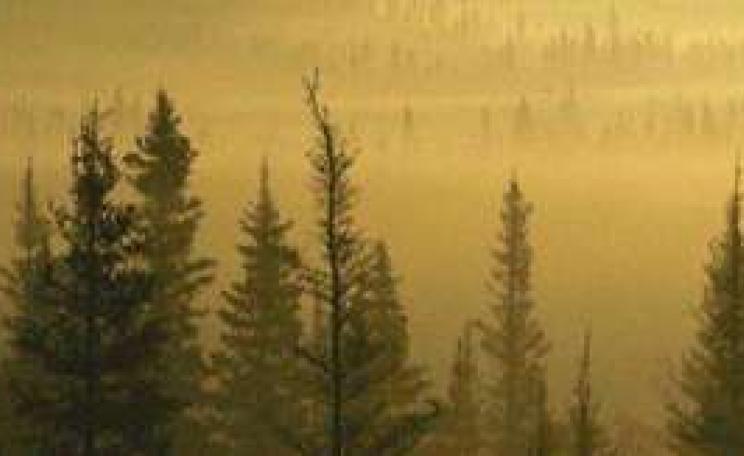© Fiona Watson/Survival
Will REDD schemes protect or threaten forest people such as the Yanomami in the Amazon?
Never before has saving the world's forests been so high up on the global political agenda.
The link between deforestation and climate change is widely accepted - as is the need for urgent action to preserve the remaining areas of natural forest and reduce the 20 percent of global greenhouse gas emissions caused by deforestation, forest degradation and peatland destruction.
Yet, perversely, these well-intentioned schemes could end up having an even more serious impact on some of the world's most vulnerable people.
Reducing emissions; ignoring rights?
The official moves to protect forests are collectively known as the UN REDD programme - 'Reducing Emissions from Deforestation and Forest Degradation'. So far, proposals drawn up under REDD have failed to properly acknowledge indigenous peoples' rights to give their full, prior and informed consent to projects on their land.
The core principal behind REDD is to help less-industrialised countries protect their remaining rainforests by paying them to keep the trees standing. One way to do this is for the carbon stored in these forests to generate 'credits', which industrialised countries can buy to offset their carbon emissions (find out more about REDD in the Ecologist's investigation here).
It's a good plan. But unfortunately, at the moment the heavily-bracketed REDD text which emerged from the November talks in Barcelona (non-paper No. 39) and which forms the basis for negotiations in Copenhagen still contains (amongst other vital omissions) inadequate protection for the rights of indigenous peoples. Nor does it contain explicit language that will ensure the protection of protecting intact natural forests.
Forests cover 12 per cent of the planet and nearly all are inhabited. Many of the peoples who live within them have customary rights to their forests, and have developed ways of life and traditional knowledge that are attuned to their forest environments. An estimated 1.6 billion people rely on tropical forests for their daily needs.
Below are profiles of four campaign groups supporting forest peoples' rights, details of what they are demanding and how to help them.
Forest Peoples Programme (FPP) works with forest peoples in South America, Central Africa, and South and South East Asia to help them secure their rights, build up their own organisations and negotiate with governments and companies as to how economic development and conservation is best achieved on their lands.
FPP is sponsoring 14 indigenous peoples' representatives to travel to the meeting and to advocate on their own behalf. Three FPP staff will be there to support their initiatives.
'We will be pushing for text that makes clear that REDD initiatives must be in line with countries' obligations under international law including the UN Declaration on the Rights of Indigenous Peoples,' says Marcus Colchester, FPP's founder and director.
Colchester is concerned about pilot REDD schemes run by agencies like the World Bank's Forest Carbon Partnership Facility (FCPF) that, he says are failing to address land and territorial rights of indigenous people and do not tackle the direct causes of forest loss, including poor forest governance and corruption.
The FPP is calling on governments to ensure that the rights of forest peoples are respected in all decisions made at Copenhagen and beyond. It may be that the finer details of REDD are decided beyond the conference.
ACTION: Forest People's Program are urging people to take part in a letter writing campaign.
The tribal rights organisation Survival International is concerned that the latest text does not fully recognize indigenous people's rights.
As Survival campaigner David Hill says: 'Yes, it mentions "rights", but both free, prior and informed consent (FPIC) and the UN Declaration on Indigenous Rights (UNDRIP ) are in brackets and may not make it into the final agreement'.
Survival International is insisting that indigenous people are able to participate fully in the climate talks at Copenhagen and that if any decisions are made affecting them they are only made with indigenous peoples' free, prior and informed consent.
It hopes to pressure the delegates by raising as much media coverage and public awareness of indigenous peoples' rights, lives and land as possible.
‘We believe that is the most effective way of achieving change,' says Survival campaigner David Hill. ‘We have written to the prime minister, Gordon Brown, highlighting our, and many indigenous peoples', concern about REDD.'
Survival's recent report ‘The Most Inconvenient Truth of All' published in November, highlights how measures to stop global warming, including biofuels, hydro-electric power, forest conservation and forest carbon trading, risk being as harmful to tribal peoples as climate change itself.
On the subject of REDD, the report quoted the International Forum of Indigenous Peoples on Climate Change (IFIPCC) statement in November 2007:
'REDD will increase the violation of our human rights, our rights to our lands, territories and resources, steal our land, cause forced evictions, prevent access and threaten indigenous agriculture practices, destroy biodiversity and culture diversity and cause social conflicts.'
David Hill says that Cophenhagen provides an opportunity for indigenous people, whose territiories are being devastated by both climate change and in the name of attempts to stop it, with an opportunity to amplify their voices, raise further awareness of their cultures, and push for further recognition of their rights.
ACTION: Survival is urging people to write to their heads of state urging them not to agree to any kind of REDD scheme, or indeed any scheme intended to mitigate climate change, if it does not fully recognise indigenous peoples' rights as enshrined in international law and the UN Declaration on Indigenous Rights. There is more information here
The Indigenous Environmental Network
The US based Indigenous Environmental Network (IEN) organisation, formed by grassroots indigenous peoples of the Americas and individuals, addresses issues of environmental and economic justice (EJ). It recently published a guide in Spanish entitled: 'REDD: Reaping profits from Evictions, land grabs, Deforestation and Destruction of Biodiversity.'
The guide explained what REDD is and why it is so threatening to indigenous peoples' rights and land. The IEN hoped the guide would be a useful tool for indigenous people ahead of the UN climate change conference in Copenhagen (COP 15). Download the guide here.
The campaign group Global Witness highlights the links between environmental exploitation and human rights abuses.
Its forest campaign involves fighting for a REDD agreement that will 'protect the world's forests, respect the rights of forest dependent peoples and preserve the fantastically rich biodiversity that forests contain'.
Global Witness says that an agreement that fails to do this could lead to alienation of communities from their lands and forced evictions. See their recommendations here and latest reports on REDD: Trick or Treat and Vested Interests.
'As highlighted in the Stern and Eliasch Reviews, REDD cannot be effectively implemented without clarification of land tenure and the full and effective participation of indigenous peoples and local communities,' says Don Lehr of Global Witness.
Global Witness is co-founder of the Ecosystems Climate Alliance (ECA), a network of Environmental and Social NGOs committed to keeping natural terrestrial ecosystems intact, on and in the ground, and out of the atmosphere, in an equitable and transparent way.
At Copenhagen, Global Witness and the ECA campaigners will be actively lobbying delegates to make sure vital indigenous rights (including their free, prior and informed consent) do not remain in brackets in the REDD text.
ACTION: Find out more about the issues here. Support Global Witness by making a donation
Laura Sevier is the Ecologist's Green Living editor
| READ MORE... | |
 |
INVESTIGATION All carbon is not born equal Are we risking serious problems if action to tackle deforestation assumes that a tonne of tree carbon is the same as a tonne of fossil carbon? |
 |
GREEN LIVING Q & A: Bruce Parry, explorer & TV presenter Bruce Parry on tree-bark trips, deforestation and lessons learnt from tribal living |
 |
HOW TO MAKE A DIFFERENCE 10 groups campaigning for the natural world Breathable air, healthy soil, fresh water and the stability of our climate all rely on our planetary life-support systems – like rainforests and oceans – being healthy. |
 |
HOW TO MAKE A DIFFERENCE CASE STUDY: learning from ancient wisdom What can indigenous wisdom teach us about how to better live within our environmental means? Maestro Tlakaelel has some tips |
 |
NEWS ANALYSIS Hedge funds for forests? Protecting rainforests is now almost as lucrative as cutting them down. Mark Anslow reports on a commodities-centred approach to stopping deforestation |








